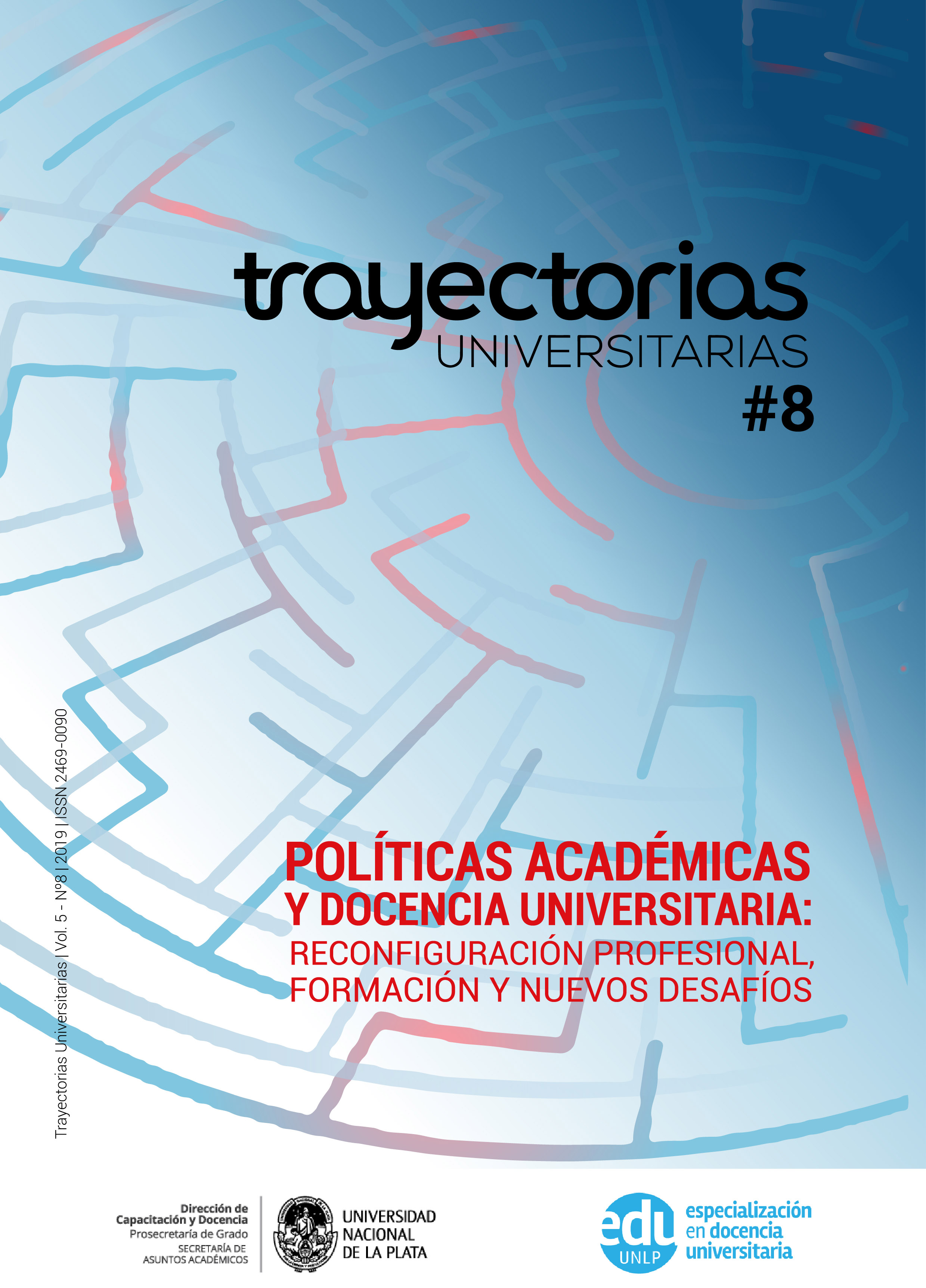Políticas académicas y docencia universitaria
Reconfiguración profesional, formación y nuevos desafíos
Resumo
El presente número de Trayectorias Universitarias, se propone recorrer algunas de las dimensiones actuales que atraviesan a la docencia universitaria, reconfigurándola, en relación con procesos que se articulan tanto con el escenario de transformaciones culturales actuales como con políticas públicas académicas para el nivel superior que replantean algunos de sus rasgos tradicionales.
Una de estas políticas, central en el sentido que planteamos, de implementación de la denominada carrera docente o carrera académica en las universidades nacionales de Argentina, es abordada por Daniela Atairo y Laura Rovelli. El trabajo de las autoras presenta resultados de una investigación en curso, en el que se analiza esta política, recuperando la complejidad que presenta el proceso y los sentidos que se articulan a la misma. Una de las conclusiones que emergen refiere a que existe en la configuración de la docencia, provocada por los perfiles de estas carreras, es una tendencia hacia la diferenciación de funciones y trayectorias, atendiendo a las dificultades que plantea que estas funciones universitarias recaigan en un mismo sujeto (docente). Esta tendencia, retoma sin duda una discusión largamente desarrollada en torno de la configuración del trabajo docente en la universidad y específicamente en torno de la calidad del desarrollo de su tarea en escenarios institucionales de intensificación del trabajo académico y de desigual reconocimiento de las funciones que desarrolla.
Por otro lado, las políticas públicas orientadas a la inclusión educativa y a la democratización de la educación superior, configuran también una trama potente que interpela a la docencia universitaria, a lo largo de todo el recorrido de formación, aunque dibujándose con más fuerza en el ingreso y el primer año de los estudios universitarios. En torno de este proceso, el trabajo de Eva Mariani, Glenda Morandi y Mónica Ros analiza, a partir de un investigación exploratoria, las perspectivas y propuestas pedagógicas de cátedras del primer año de la UNLP, acerca de los desafíos que supone la inclusión educativa, y las respuestas en términos de estrategias y prácticas desde la que intentan promoverla. Es posible observar cómo los procesos articulados a las políticas de inclusión, discuten profundamente con algunos sentidos tradicionales acerca de la enseñanza universitaria, los sentidos de la formación, los saberes que se recortan como legítimos y los micro escenarios en los que los procesos de formación tienen lugar. En este marco de reconfiguración de las prácticas académicas en la Universidad, el artículo de Marcela Sosa analiza la trayectoria de jóvenes investigadores en su incorporación a la experiencia académica una vez graduados, en un contexto de complejización de las posibilidades de ejercicio de su rol en la Universidad. De acuerdo con la autora la transitoriedad del vínculo laboral actual, en el pasaje de becario a planta transitoria, remite a las incertidumbres en las políticas en ciencia en nuestro país, en un escenario de restricción presupuestaria, diferente del anterior, así como al mantenimiento de los proyectos iniciados en su institución. Es crucial también en ese sentido, la conclusión acerca de la relevancia que tienen para la inserción académica de estos profesionales, las biografías escolares previas en su posible diálogo o entramado con los modelos académicos y disciplinares hegemónicos.
Las reconfiguraciones acontecidas en la docencia, se recuperan también en el trabajo de Lucarelli, quien centra el análisis en los modos en que se replantea, en consecuencia, el sentido de la formación docente y el rol de los Asesores Pedagógicos en los espacios que coordinan. Como señala la autora, las acciones comienzan a caracterizarse por crear situaciones en que las que el “formador incorpora explícitamente el conocimiento de sí mismo, de lo afectivo, de lo relacional, como estrategia y contenido de esos programas”. Se profundiza en el rol activo y participativo de ambos sujetos del proceso, en un contexto en que la problematización de las prácticas y las subjetividades, se torna fundamental para atravesar las mudanzas y variaciones que se plantean en la docencia y la enseñanza.
Este número recupera de manera sustancial también, las experiencias innovadoras que los docentes universitarios de distintas disciplinas y áreas han construido, reflexionado e implementado a partir de los debates y compromisos que atraviesan a esta institución. Los trabajos de la sección Experiencias y Propuestas configuran aportes creativos y críticos que expresan la posibilidad concreta de articular teorías y prácticas, realidades y desafíos, anhelos y logros.
Los invitamos a recorrerla.
Downloads
Publicado
Edição
Seção
Licença
Esta obra está bajo una licencia internacional Creative Commons Atribución-NoComercial-CompartirIgual 4.0.
Acorde a estos términos, el material se puede compartir (copiar y redistribuir en cualquier medio o formato) y adaptar (remezclar, transformar y crear a partir del material otra obra), siempre que a) se cite la autoría y la fuente original de su publicación (revista y URL de la obra), b) no se use para fines comerciales y c) se mantengan los mismos términos de la licencia, sin que sea necesario pedir permiso previo al editor o al/la autor/a.























